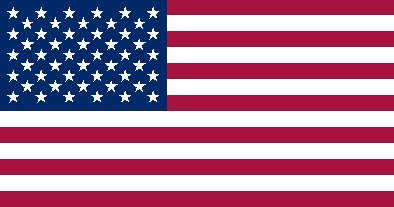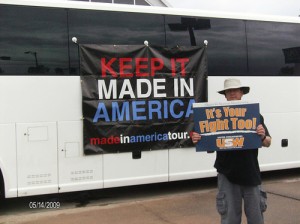Editorial
Made in America – a personal story

Time was that you could walk into any store in America and find that most product labels read “Made in America.” No more.
Made in America or China?
Last July I picked up a flag at our local dollar store and was about to buy it. Then my husband asked me to look at the label to see where it was made. To my great surprise it read “Made in China.” I put the flag down and walked over to another store. The flags there all came from Annin, an American company that has made flags since 1847. I bought those instead.
Today it may take some effort to find products made in the United States. But it’s an effort worth making. We all complain about the trade deficit – especially with China. Yet we do little to correct that deficit. Shoppers usually focus more on value for money. They won’t read the label to find out where the product came from. But what is really the higher value? Is the higher value a product that is cheaper, but costs America its prosperity? Or is it a product made in America, that might cost a little more but keeps an American on the job and not on the dole? Diane Sawyer (ABC News) stated on a recent Bill O’Reilly show that for every $3.33 we spend on an American-made product, we save or create an American job. With the unemployment rate up to 9.1%, can we really afford the cheaper product?
Cars made in America or Japan?
The American car industry is the prize example. While competition is a good thing, foreign cars originally began to outsell American cars based on cost alone. Nowadays, we collectively believe that foreign cars are better made than American cars. That might have been true a decade or two ago. But the competition did what competition usually does – forced American car makers to improve their quality. A perfect example is the Chevy Cruz Eco. It sells for $19,800 and gets 42 miles per gallon on the highways. We wanted better, more-efficient cars, and we got them.
If you’re thinking “Government Motors” – no way. The vast majority of now-laid-off General Motor employees did not work for the government. And if you’re thinking that Toyota has American-based factories, remember this: the profits that Toyota makes, go back to Japan. You may think you’re getting a better deal when you buy a foreign product. But I urge you to think again. The cost may be higher than you think. Just consider what the escalating unemployment rate costs you in taxes, and how it contributes to the nation’s deficit. America may have a spending problem, but it also has a income-producing problem. We can solve a great part of that problem simply by buying American made goods.
[amazon_carousel widget_type=”ASINList” width=”500″ height=”250″ title=”” market_place=”US” shuffle_products=”True” show_border=”False” asin=”B00375LOEG, 0451947673, 0800733940, 0062073303, 1595230734, 1936218003, 0981559662, 1935071874, 1932172378″ /]
Made in America no more
Maytag is a case of good business going bad. Founded in 1893 in Newton, Iowa, the company became the largest feeder manufacturer in the world by 1902. In 1907 the company began producing what would become its signature product: washing machines. (“Not all Maytag repairmen are this lonely, but we’re trying.”) During WWII, Maytag stopped making washing machines and re-tooled to produce war materiel. Should America be involved in another world war, Companies like Toyota, Honda, or Samsung are not likely to do what Maytag did.
But the American success story of Maytag doesn’t end on a noble note. In September of 2004, it moved to Reynosa, Mexico and took its jobs with it. 1600 employees in the Galesburg, Illinois plant alone lost their jobs. The unions couldn’t stop the controlling company, The Woods Foundation, from facilitating the move. As a matter of interest, at that time Mr. Barack Obama and Mr. William Ayers were on the board of The Woods Foundation.
On a smaller scale but just as devastating to is 300 employees, is the case of Vise Grip. In 1924 blacksmith Bill Peterson invented the ingenious tool. In September 2008, 300 workers in Lincoln, Nebraska lost their jobs when this All-American company moved to China.
Made in America once more
As with school choice, the solution to the trade deficit does not necessarily lie with the government and the government only. We the People can change our nation’s red ink to black ink by simply taking time to read labels and preferring goods made in America whenever possible. Resources are available to make this easier. (And more where these came from, and more to come.) Should we do this, we will surely see an increase in the employment rate and not the unemployment rate, and see American companies return to American soil. After all, it won’t do these companies any good to produce cheaper goods if no one buys them.
-

 News23 hours ago
News23 hours agoRolling the Dice on Republicans: Has the Right Become Delusional?
-

 Executive18 hours ago
Executive18 hours agoJanuary 6 case comes down to selective prosecution
-

 Civilization24 hours ago
Civilization24 hours agoBiology, the Supreme Court, and truth
-

 Executive3 hours ago
Executive3 hours agoWhy Fatal Police Shootings Aren’t Declining: Some Uncomfortable Facts
-

 Entertainment Today4 hours ago
Entertainment Today4 hours agoWaste of the Day: Throwback Thursday: Millions Went To Video Game ‘Research’
-

 Constitution2 hours ago
Constitution2 hours agoEquality Under the Law and Conflicts of Interest in New York
-

 Guest Columns2 hours ago
Guest Columns2 hours agoWhat Was Won in No Labels’ Crusade
-

 Civilization1 hour ago
Civilization1 hour agoPresident Biden Must Not Encourage Illegal Mass Migration From Haiti















Why do you expect me to pay more for the same product just because it’s made in America? You might as well be asking me to opt into paying more taxes, and I’m not going to do that, either.
This is capitalism at work. Chinese products are cheaper? Guess we need to retool our industry the way we did for those Japanese cars you mentioned. Buying stuff made in America when another country does it better and cheaper is just welfare capitalism on the small scale.
You don’t get it. The issue is labor costs. In China as it was in Japan, Korea and other pacific rim countries you have populations where they work for 1/10th of the average salary that a person living in Michigan can *afford* to work for,
General Motors can buy the same robots for painting, the same equipment for the assembly line. They could duplicate the entire factory down to the last window and it still would not matter.
When you are paying your labor 10 cents on the dollar as compared to American workers you will never beat them on price and that is simple economics.
Raw materials as well. China has the worst pollution this side of India. Please recall China had had most of Beijing shut down for the Olympic games so the air would be breathable for the athletes.
I am a software engineer. My work keeps getting farmed out to India because they are paid 25 cents on the dollar as compared to the wages I *need* to make to be able to buy a house and live my life.
In case you have not noticed the price of *everything* in this country keeps going up and business is doing their level best to push wages down as much as they can.
I would be happy to compete on wages, *if I could* and afford to live anywhere but in a cardboard box under a freeware overpass, but when those wages are someplace between 5 and 10 dollars per hour I simply cannot.
It’s unfair to ask the American citizen to buy a piece of garbage car out of some sort of ridiculous “patriotism” while workers at GM and Ford made far more than the average laborer. American car companies are just now making decent automobiles that people might actually want to buy for under 40,000$. Maybe if they get their business in line, people will come back to them.
American car companies botched their own market share. They could have charged more money for their cars, so long as they were of superior quality, and would have had no problem holding onto 90% of the market in the US. But not only were their costs higher, their products were trash. They got exactly what they deserved.
I feel for anyone who got a degree in a technical field that had their job farmed out to another country, but on that note, do we advocate economic nationalism then?
“If you’re thinking “Government Motors” – no way. The vast majority of now-laid-off General Motor employees did not work for the government.”
When the share holders got the shaft, that was the last straw. Sorry but never again will I buy anything built by the uaw. I now research every major purchase – even at work – to be sure that the product/company I am buying does not contribute/support/or help elect liberal commie hacks either here or outside the USA.
[…] Made in America – a personal story – Conservative News and Views Time was that you could walk into any store in America and find that most product labels read “Made in America ” No more. […]
[…] Made in America – a personal story – Conservative News and Views Time was that you could walk into any store in America and find that most product labels read “Made in America ” No more. […]
Diane Sawyer is hardly to be considered an informed authority on the economy.
Also: Obama being on The Woods Foundation at the same time as the event you mention taking place DOES NOT EQUAL Obama killing American jobs as you “subtly” imply afterwards.